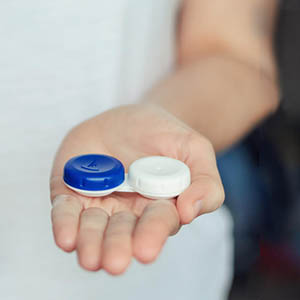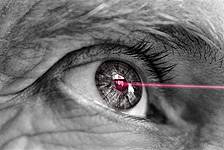If your regular contact lenses are causing you discomfort, ask your eye doctor about switching to scleral lenses.
Scleral lenses are rigid gas permeable (RGP) contact lenses that are notably larger than conventional contact lenses. Scleral lenses are designed to vault over the cornea and rest on the sclera, the white part of the eye.
Since scleral lenses do not come in contact with the cornea, these contact lenses are more comfortable for patients with corneal irregularities, dry eye syndrome, and other eye conditions that make it difficult to wear traditional contact lenses.
Moreover, prior to insertion, fresh saline solution is applied to the “bowl” of the scleral lens. This solution remains in the area between the scleral lens and cornea throughout the day, to provide constant hydration and a moist environment to the surface of the eye.
Because of their size, stability on the eye, and ability to provide continual hydration, scleral lenses offer excellent vision and maximum comfort for people of all ages, with a variety of conditions.
If you have been diagnosed with any of the following conditions, speak to an optometrist near you about switching to scleral lenses.
SEE RELATED: Contact Lenses for Giant Papillary Conjunctivitis (GPC)
Dry eye
While soft contact lenses are known for absorbing moisture from the eye, scleral lenses actually provide moisture to the eye.
The liquid reservoir offers continuous hydration and dry eye relief throughout the day.
Additionally, due to their larger size, scleral lenses protect the eye’s surface from dry environments and harsh winds that can make dry eyes worse. They are also less likely to move around the eye and cause eyelid irritation upon blinking.
Scleral lenses not only protect the cornea, they also promote healing for those who suffer from dry eye syndrome.
Keratoconus
Keratoconus, a condition that is characterized by irregularly shaped corneas, can cause blurry or cloudy vision, as well as sensitivity to light.
If your cornea is irregularly shaped, contact lenses that sit directly on your cornea are most likely not an option for you.
Scleral lenses however, do not sit on the cornea, but instead rest on the sclera of your eye — making them an ideal lens for people with keratoconus.
Corneal transplants
If you have recently undergone a corneal transplant, your cornea needs time to heal. Complete healing from a corneal transplant can sometimes take up to a year, and during this time your cornea may be extra sensitive. To protect your cornea while it heals, your eye doctor may recommend wearing scleral lenses.
Moreover, wearing scleral lenses may even help to eliminate the need for a corneal transplant. Like any other surgical procedure, a corneal transplant comes with risks of potential complications— not to mention a long recovery period.
Ask your eye doctor if scleral lens wear can eliminate your need for a corneal transplant.
Eye allergies
If your eyes are constantly red, itchy, watery, and sore, you may have eye allergies.
Eye allergies can make regular contact lens wear quite uncomfortable. Rubbing your eyes while wearing contact lenses can cause the lens to move, become dislodged, and can even cause a corneal abrasion.
Scleral lenses are larger than traditional contact lenses and therefore offer your eyes the protection they need from dust, pollen, and other airborne allergens— minimizing your exposure and reducing your allergy symptoms.
Other eye conditions
- High levels of myopia (nearsightedness), hyperopia (farsightedness), and astigmatism
- Corneal ectasia
- Corneal dystrophy
- Corneal abrasions
- Ocular surface diseases
- Post radial keratology (RK) for myopia correction
- Pellucid marginal corneal degeneration
- Stevens-Johnson syndrome (SJS)
Scleral lenses are custom-made contact lenses that provide maximum comfort and superior vision clarity for patients who cannot benefit from traditional contact lenses.
LEARN MORE: Optical and Contact Lenses
Schedule an appointment with an eye doctor near you to find out if scleral lenses are the right solution for you.









